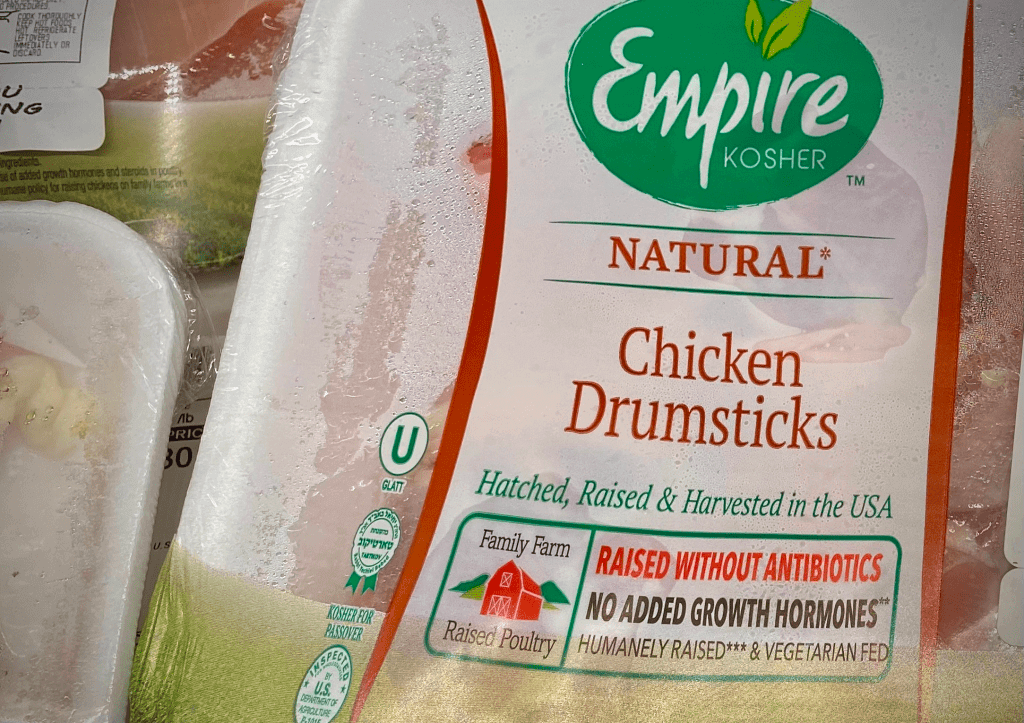What is the drug we found in Empire Chicken?
Earlier this year, JIFA released the results of groundbreaking testing of Empire kosher chicken taken directly from grocery store shelves. The drug we found, fenbendazole, is an antiparasitic used widely in industrial animal farming to treat common infections that occur in poultry raised on crowded factory farms. We should be deeply concerned about these findings, which link Empire to a broader problem of unregulated use of drugs in industrial animal agriculture.
Medically important drug sales for livestock are nearly double those for human medicine. Overuse of antibiotics and antiparasitics can and is leading to global resistance–making these medications less effective in the long term. Growing resistance to these drugs alone already has significant consequences for global health; one model estimates that nearly five million deaths were associated with antimicrobial resistance in 2019.
Along with Farm Forward, JIFA commissioned the Health Research Institute to test a set of samples purchased at various grocery stores. Highly sensitive mass spectrometry (a tool for measuring the presence of molecules in a sample at low levels) detected drug residue in samples of Empire’s kosher chicken. Among the products sampled, 13 percent tested positive for fenbendazole.
While fenbendazole isn’t prohibited under conventional standards, the USDA Organic program bans the drug’s use on the farms it certifies– highlighting why antiparasiticide use is closely associated with deplorable husbandry on factory farms. In a 2020 meeting, for example, a board member from the National Organic Standards Board (NOSB) raised concerns that allowing fenbendazole on organic egg farms may inadvertently allow more crowded conditions for birds. This is indeed the logic of modern factory farming: antimicrobials are a key way to deal with the conditions and diseases that inevitably stem from extreme confinement and crowding. The USDA’s worry about farms’ reliance on fenbendazole should concern all of us: most of Empire’s products, and the ones we tested, are conventional (not USDA Organic) which means that Empire has license to freely administer and overuse drugs like fendbendazole in their congested, disease-prone operations.
Do shoppers make a distinction between antibiotics and other drugs in their meat?
Empire Kosher claims that its products are “raised without antibiotics,” and as a drug that targets parasites in chickens fenbendazole doesn’t violate their policy disallowing antibiotics. However, one meta-analysis showed that consumer perceptions of antimicrobial use—which includes antiparasitics—in animal agriculture are exceptionally negative and that concern over residue (i.e., what we found in our testing) is a contributing factor to those negative perceptions. So, it may be that consumers are concerned over the presence of drug residue in their meat generally and not just a specific type of drug. Yet the filthy conditions that run rampant through the food system—and that includes kosher labeled meat—do not merely allow for the widespread use of antimicrobials, they demand it.
It shouldn’t take an advocacy nonprofit to determine what actually is in a product labeled as kosher. And kosher products shouldn’t come from factory-farmed animals. Join the movement and urge your Jewish community to commit to serving alternatives to factory-farmed products like Empire chicken.




